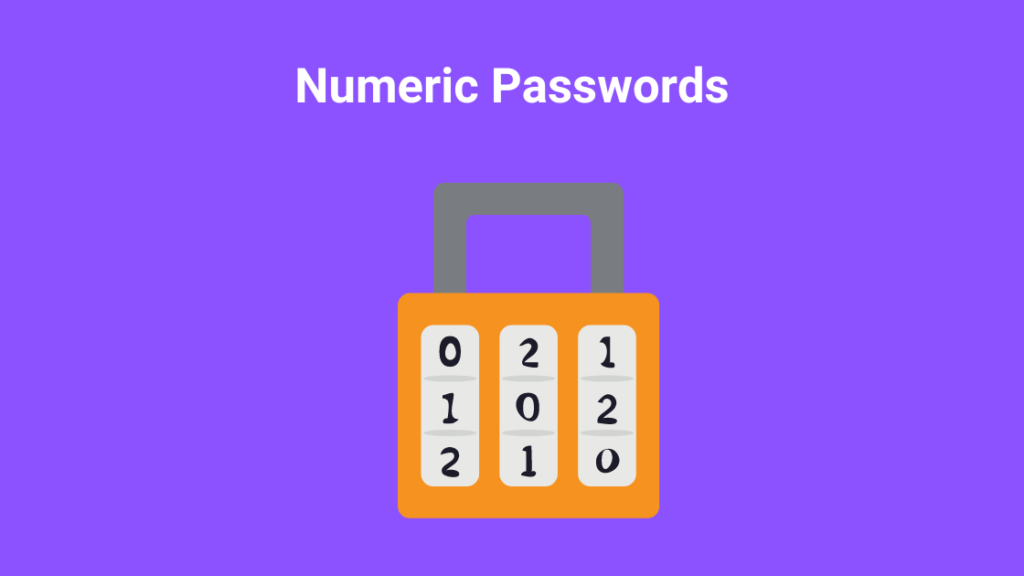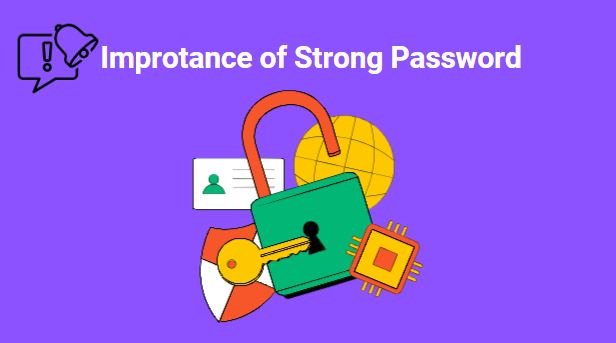| Unlock the world of numeric passwords! 🔓🔑 Uncover the secrets behind this simple yet powerful authentication method. 💪🔒 |

In today’s technology-driven world, where we’re constantly logging into various online accounts, passwords have become an essential part of our digital lives. They act as a shield, protecting our sensitive information and guarding against unauthorized access. However, the question remains: are numeric passwords still a secure option in the face of evolving cyber threats?
What is a Numeric Passwords?
As the name suggests, are passwords composed entirely of numbers. They have been around since the early days of computing when security was a simpler affair. Back then, a four-digit password was considered sufficient to protect sensitive information.
Example of a Numeric Passwords
Let’s say you’re a fan of the number 42 and want to create a password. You might choose “4242” as your password. While it may seem secure at first glance, we’ll explore its vulnerabilities later on.
Numeric Password: Strengths and Weaknesses
These often used for access to payment gateways, shopping sites, and ATMs, offer certain advantages. Their simplicity makes them easier to remember and type, especially for those who may struggle with more complex alphanumeric passwords. Additionally, they can be more challenging for hackers to crack using dictionary attacks, as they rely on a smaller character pool.
However, when it comes to overall security, numeric password face some inherent drawbacks. Their limited character set makes them more vulnerable to brute-force attacks, where hackers use automated programs to guess passwords systematically. Additionally, they can be easier to crack using rainbow tables, large databases of pre-computed password hashes.
Best Practices for Numeric Password
- Length Matters: Longer numeric password are harder to crack. Aim for a minimum of eight digits, but don’t be afraid to go even longer.
- Avoid Predictable Patterns: Stay away from obvious sequences like “123456” or repeating numbers like “111111.” Instead, opt for random combinations that have personal meaning to you.
- Mix It Up: Consider using a combination of letters and numbers in your numeric password to increase complexity. For example, you could replace certain numbers with corresponding letters (e.g., “H3ll0” instead of “Hello”).
| Read more: Passphrases: Unlocking the Power of Passwords OTP : One-Time Passwords Biometric Passwords: A Secure and Futuristic Authentication Method The Power of Alphanumeric Passwords |
Mistakes to Avoid
- Reusing Passwords: Using the same numeric password across multiple accounts is a big no-no. If one account is compromised, all your other accounts become vulnerable.
- Sharing Passwords: Avoid sharing your numeric password with anyone, even if you trust them. You never know when a friend’s device might get hacked, putting your password at risk.
- Neglecting Regular Updates: Change your numeric password periodically to stay ahead of potential threats. Aim for a password update every three to six months.
Alternatives to Numeric Password: Enhancing Security
While numeric password may have been sufficient in the past, as cyber threats become more sophisticated, it’s crucial to consider stronger alternatives. Alphanumeric passwords, which combine letters, numbers, and symbols, offer significantly enhanced security due to their greater character pool and complexity.
Other password-strengthening measures include:
- Password length: Aim for passwords with at least 12 characters, as longer passwords increase the time and effort required for hackers to crack them.
- Password complexity: Include a mix of uppercase and lowercase letters, numbers, and symbols to further complicate cracking attempts.
- Password uniqueness: Never use the same password for multiple accounts. If one account is compromised, all others with the same password are at risk.
- Password managers: Consider using password managers, software that securely stores and manages your passwords. This can help you create strong, unique passwords for all your accounts without the need to remember them.
- Two-factor authentication (2FA): Enable 2FA whenever possible. This adds an extra layer of security by requiring a verification code from your phone or email in addition to your password for login.
Numeric Password: A Suitable Choice for Specific Scenarios
While numeric password may not be the most secure option overall, they can still be a viable choice for specific situations:
- Temporary passwords: When using temporary passwords for one-time access, numeric passwords may be sufficient, as they’re unlikely to be targeted by hackers.
- Devices with limited input options: If you’re accessing a device with limited input options, such as ATM keypads or older mobile phones, numeric password may be the only practical choice.
Here is a table comparing the security of numeric and alphanumeric passwords:
| Password type | Security level |
|---|---|
| Numeric password (12 characters) | Low |
| Numeric password (16 characters) | Medium |
| Alphanumeric password (8 characters) | High |
| Alphanumeric password (12 characters) | Very high |
| Alphanumeric password (16 characters) | Extremely high |
As you can see, the security level of your password depends on both the length and complexity of the password. Numeric passwords are inherently less secure than alphanumeric passwords because they have a smaller character pool. However, you can still make numeric password more secure by making them longer and more complex.
In summary, while numeric password offer certain advantages, especially in terms of memorability and ease of use, they shouldn’t be considered a standalone security measure in today’s digital landscape. By combining numeric password with other security practices, such as using alphanumeric passwords, enabling 2FA, and avoiding password reuse, you can significantly enhance the overall security of your online accounts.
What is an example of numerical password?
Here is the 8 character numeric password example:
58979323
Are numeric password safe?
Numeric password are not as secure as alphanumeric passwords, which include letters, numbers, and symbols. This is because numeric password have a smaller character pool, making them more vulnerable to brute-force attacks, where hackers use automated programs to guess passwords systematically.


